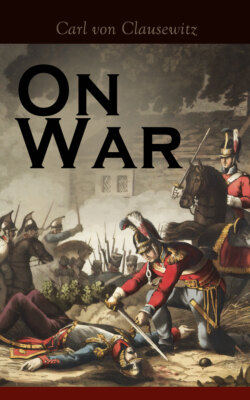Читать книгу On War - Carl von Clausewitz - Страница 107
На сайте Литреса книга снята с продажи.
CHAPTER IV.
The Chief Moral Powers
ОглавлениеTable of Contents
These are The Talents of the Commander; The Military Virtue of the Army; Its National feeling. Which of these is the most important no one can tell in a general way, for it is very difficult to say anything in general of their strength, and still more difficult to compare the strength of one with that of another. The best plan is not to undervalue any of them, a fault which human judgment is prone to, sometimes on one side, sometimes on another, in its whimsical oscillations. It is better to satisfy ourselves of the undeniable efficacy of these three things by sufficient evidence from history.
It is true, however, that in modern times the Armies of European states have arrived very much at a par as regards discipline and fitness for service, and that the conduct of War has—as philosophers would say—naturally developed itself, thereby become a method, common as it were to all Armies, so that even from Commanders there is nothing further to be expected in the way of application of special means of Art, in the limited sense (such as Frederick the Second’s oblique order). Hence it cannot be denied that, as matters now stand, greater scope is afforded for the influence of National spirit and habituation of an army to War. A long peace may again alter all this. 16
The national spirit of an Army (enthusiasm, fanatical zeal, faith, opinion) displays itself most in mountain warfare, where every one down to the common soldier is left to himself. On this account, a mountainous country is the best campaigning ground for popular levies.
Expertness of an Army through training, and that well-tempered courage which holds the ranks together as if they had been cast in a mould, show their superiority in an open country.
The talent of a General has most room to display itself in a closely intersected, undulating country. In mountains he has too little command over the separate parts, and the direction of all is beyond his powers; in open plains it is simple and does not exceed those powers.
According to these undeniable elective affinities, plans should be regulated.
16. Written shortly after the Great Napoleonic campaigns.
